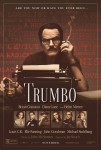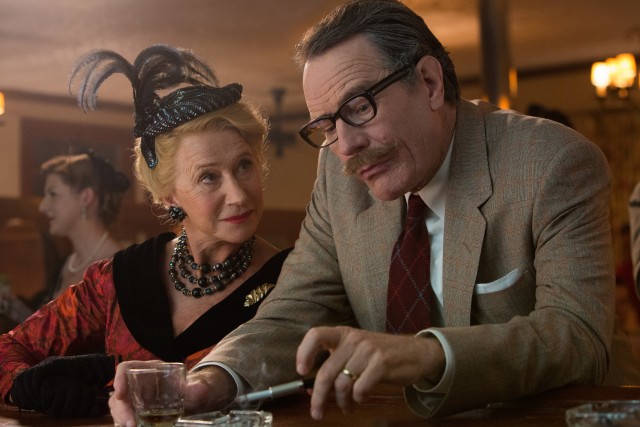Trumbo Movie Review
 |
Trumbo
Theatrical Release: November 6, 2015 / Running Time: 124 Minutes / Rating: R Director: Jay Roach / Writers: John McNamara (screenplay), Bruce Cook (book Dalton Trumbo) Cast: Bryan Cranston (Dalton Trumbo), Diane Lane (Cleo Trumbo), Helen Mirren (Hedda Hopper), Adewale Akinnuoye-Agbaje (Virgil Brooks), Louis C.K. (Arlen Hird), David James Elliott (John Wayne), Elle Fanning (Nikola Trumbo), John Goodman (Frank King), Michael Stuhlbarg (Edward G. Robinson), Alan Tudyk (Ian McLellan Hunter), Dan Bakkedahl (Roy Brewer), Roger Bart (Buddy Ross), Christian Berkel (Otto Preminger), Peter Mackenzie (Robert Kenny), Dean O'Gorman (Kirk Douglas), Richard Portnow (Louis B. Mayer), Stephen Root (Herman King) |
Embraced by the film industry to a large degree since showing his dramatic chops in the decorated, landmark "Breaking Bad", Trumbo (Cranston) is forthright about his party membership, which is his right under the US Constitution. Alas, as the Cold War intensifies in the wake of World War II, Hollywood as well as the rest of the nation grows increasingly suspicious of all people who sympathize with the policies and views of the Soviet Union. Soon, the productive writer of films in a variety of genres is subpoenaed to testify before the House Un-American Activities Committee along with other friends and colleagues believed to belong to the Party.
Refusing to answer HUAC's questions, Trumbo finds himself in contempt of the court. He and others are jailed, as the nation shakes its collective fists, appalled at these unpatriotic traitors. When Trumbo gets out a couple of years later, his children have grown and his employment options have disappeared as a direct result of Hollywood's blacklist. Trumbo is credited under another writer's name on Roman Holiday, for which he wins an Oscar (but cannot accept). Nonetheless, he and his fellow personae non gratae resort to made-up pseudonyms as they take whatever work is given them by schlock moguls the King Brothers (John Goodman and Stephen Root).
Trumbo rewrites a variety of B-movies for the undiscerning studio at a fraction of his former pay. He also can't resist giving them a good original movie, The Brave One, which becomes the second original screenplay Oscar he wins but cannot accept with others' names in the credits. With influential gossip Hedda Hopper (Helen Mirren) churning her gears, the moonlighting efforts of Trumbo and other Communists becomes an open secret that reaches both Kirk Douglas, who is eager to have Spartacus turn out right, and Austrian-American director Otto Preminger, who wants help on Exodus.
Trumbo's subject matter may strike you as the stuff of television movies. That has frequently been the domain of director Jay Roach lately, despite his considerable success in big screen comedy, having helmed Meet the Parents, Meet the Fockers, and all three Austin Powers movies. It's not as though Roach has been slumming or slumping; those TV movies (Game Change, Recount) were for HBO, so naturally a number of Emmys and Golden Globes came his way. Trumbo could have gone that route without much change or any stigma. But wielding a good amount of star power and a direct connection to the medium, it instead has opened in limited release as the fifth film theatrically distributed by upstart Bleecker Street.
The big screen writing debut of TV veteran John McNamara (creator of "Aquarius" and co-creator of "Fastlane"), Trumbo is a fun movie. You can't say that about many biopics and historical dramas, but this one has the intelligence to realize that even in Hollywood's most sacred stretch, show business is a bit of a frivolous circus. Trumbo churns out 100-page screenplays in three days. He works best in a bathtub, typewriter propped up just below his head, cigarette holder and Scotch always at arm's reach. Many recognize his talent, but it means nothing in this age of McCarthyism and Trumbo scrambles to provide for his family with his name sullied.
The movie takes evident delight in recreating Hollywood's most glamorous age. It casts actors in the roles of Edward G. Robinson (Michael Stuhlbarg), John Wayne (David James Elliott), and Kirk Douglas (Dean O'Gorman), giving us looks at matinee idols as they really existed, or as reported in the source text, Bruce Cook's 1977 book about Dalton Trumbo. It's tricky to portray recognizable celebrities, especially when they pop up for short periods of time. That was one of the numerous factors that made Lee Daniels' The Butler less enjoyable than intended. Mirren as Hopper seems inspired casting, not just because she's one of three actresses in her age group with star power. Stuhlbarg bears little resemblance to Robinson and doesn't even attempt to reproduce his distinct voice. Wayne and Douglas are both difficult to recreate, but the relative unknowns in the roles do what they can. The large cast also includes an unremarkable Diane Lane as Trumbo's wife and an enjoyable but completely anachronistic Louis C.K. as Trumbo's best friend and fellow Communist screenwriter.
The movie, however, belongs to Trumbo and Cranston does an impressive job carrying a picture all on his own (which he's already proved able to do with TV shows and Broadway plays). Trumbo is a character and one we enjoy getting to know, even as he berates his daughter (a flat Elle Fanning) for interrupting his work on her 16th birthday. Trumbo does not have the poignancy and impact of other recent films It was just announced that Trumbo would not receive Comedy or Musical designation from the Golden Globes, which would have essentially guaranteed it a presence in this recently begun award season. With animated films out of the running and a few other hopefuls crushed by critics and the box office, it was almost impossible to imagine a five nominee Best Picture field that didn't include this movie. Heck, Cranston even seemed to have a legitimate shot at winning Best Actor if he was competing in Comedy or Musical. Instead, the movie could come away empty-handed, or Cranston could perhaps sneak a spot in the typically more competitive Best Actor in a Drama category and the dearth of substantial roles could help Mirren break into the Globes' catch-all Supporting Actress category, assuming celebrity remains a consideration for the Hollywood Foreign Press. Even with some awards recognition, I don't see Trumbo doing huge business, but at least the film's worth should deservedly keep Cranston on Hollywood's short list of viable leading men.
|
Related Reviews:
DVDizzy.com | DVD and Blu-ray Reviews | New and Upcoming DVD & Blu-ray Schedule | Upcoming Cover Art | Search This Site
DVDizzy.com Top Stories:
Now in Theaters: Bridge of Spies • Brooklyn • Spotlight • Love the Coopers • Steve Jobs • The Martian
Bryan Cranston: Argo • Godzilla • Drive • Breaking Bad: The Complete Second Season | Diane Lane: Secretariat • Man of Steel
Helen Mirren: Hitchcock • Woman in Gold | Michael Stuhlbarg: Hugo • Pawn Sacrifice • A Serious Man • Men in Black 3
Directed by Jay Roach: The Campaign
Sunset Blvd. • My Week with Marilyn • The Rocketeer
Text copyright 2015 DVDizzy.com. Images copyright 2015 Bleecker Street.
Unauthorized reproduction prohibited.

